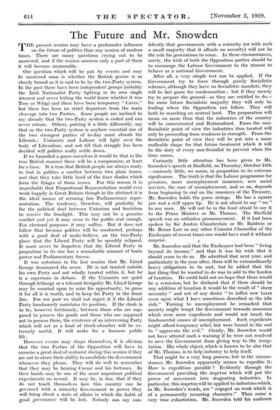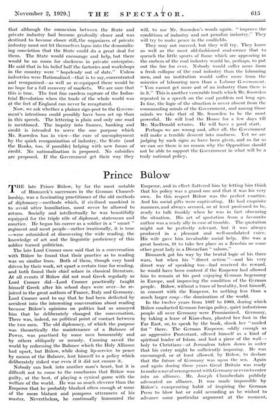The Future and Mr. Snowden
THE present session may have a profounder influence on the future of politics than any session of modem times. There are many questions crying out to be answered, and if the session answers only a part of them it will become memorable.
One question which will be put by events and may be answered soon is whether the British genius is as closely bound as it is said to be by the two-Party system. In the past there have been independent groups (notably the Irish Nationalist Party fighting in its own single interest and never letting the world know whether it was Tory or Whig) and there have been temporary "Caves," but there has been no strict departure from the main cleavage into two Parties. Some people are inclined to say already that the two-Party system is ended and can never return. Others, putting it a little differently, say that as the two-Party system is anyhow essential one of the two strongest parties of to-day must absorb the Liberals ; Unionists and Labour will fight over the body of Liberalism, and not till that struggle has been decided will polities really settle down.
If we hazarded a guess ourselves it would be that in the true British manner there will be a compromise, at least for a time. It is true that British people are always ready to find in politics a conflict between two plain issues, and that they take little heed of the finer shades which form the fringes of those issues. For this reason it is improbable that Proportional Representation would ever work happily in Great Britain though in the abstract it is the ideal means of securing fair Parliamentary repre- sentation. The tendency, therefore, will probably be for the political duel between Unionism and Socialism to receive the limelight. This may not be a genuine conflict and yet it may seem to the public real enough. For electoral purposes it may suffice. But it does not follow that because politics will be conducted, perhaps with a good deal of make-believe, on the two-Party plane that the Liberal Party will be speedily eclipsed. It must never be forgotten that the Liberal Party in proportion to its size has a remarkable amount of brain power and Parliamentary finesse.
It was notorious in the last session that Mr. Lloyd George dominated the scene. He is not trusted outside his own Party and not wholly trusted within it, but he is a superman in debate. If the Unionists are quiet through lethargy or a tolerant benignity Mr. Lloyd George may be counted upon to seize his opportunity, to press it for all it is worth, and to keep his Party in the front line. For our part we shall not regret it if the Liberal Party handsomely maintains its position. If the clash is to be, however fictitiously, between those who are sup- posed to possess the goods and those who are supposed not to possess them, the existence of an intervening Party which will act as a kind of shock-absorber will be ex- tremely useful. It will make for a humane public life.
However events may shape themselves, it is obvious that the two Parties of the Opposition will have to exercise a great deal of restraint during this session if they are not to abuse their ability to annihilate the Government whenever they please. They will do well to remember that they may be bearing Caesar and his fortunes. In their hands may be one of the most important political experiments on record. It may be, in fine, that if they do not teach themselves how this country can be governed with a minority Government in power they will bring about a state of affairs in which the habit of good governance will be lost. Nobody can say con- fidently that governments with a minority (or with such a small majority that it affords no security) will not be the rule for generations to come. In these circumstances, surely, the wish of both the Opposition parties should be to encourage the Labour Government to the utmost to behave as a national Government.
After all, a very simple test can be applied. If the Government try to force through purely Socialistic schemes, although they have no Socialistic mandate, they will be fair game for condemnation ; but if they merely try to prepare the ground—as they are entitled to do— for some future Socialistic majority they will only be leading where the Opposition can follow. They will both be marching on neutral land. The preparation will mean no more than that the industries of the country will be concentrated and Rationalized. From the non- Socialistic point of view the industries thus treated will only be proceeding from weakness to strength. From the Socialistic point of view they will be put into a more malleable shape for that future treatment which it will be the duty of every non-Socialist to prevent when the time comes.
Curiously little attention has been given to Mr. Snowden's speech at Sheffield, on Thursday, October 24th —curiously little, we mean, in proportion to its extreme significance. The truth is that the Labour programme for pensions, more unemployment insurance, new social services, the cure of unemployment, and so on, depends from beginning to end on the resources of the Treasury. Mr. Snowden holds the purse strings. He has a square jaw and a stiff upper lip. He is not afraid to say " no " to any man. He will not be in the least afraid to say it to the Prime Minister or Mr. Thomas. The Sheffield speech was an orthodox pronouncement. If it had been spoken by Sir Austen Chamberlain or Mr. Baldwin or Mr. Bonar Law or any other Unionist Chancellor of the Exchequer of recent times one would have read it without surprise.
Mr. Snowden said that the Exchequer had been" living beyond its income," and that it was his wish that it should cease to do so. He admitted that next year, and particularly in the year after, there will be extraordinarily heavy obligations to be met, but he added that the last thing that he wanted to do was to add to the burden of taxation. He could hold out no hope that there would be a remission, but he declared that if there should be any addition of taxation it would be the result of" sheer necessity" and not of any desire "to inflict new taxes even upon what I have sometimes described as the idle rich." Turning to unemployment he remarked that anxiety might tempt the Government towards measures which were mere expedients and would not touch the fundamental causes of unemployment. Such expedients might afford temporary relief, but were bound in the end to "aggravate the evil." Clearly, Mr. Snowden would not have uttered such a warning if he were not resolved to save the Government from giving way to the temp- tation. His whole object, which is known to be also that of Mr. Thomas, is to help industry to help itself.
That might be a very long process, but in the circum- stances Mr. Snowden apparently means to expedite it; How is expedition possible ? Evidently through the Government providing the impetus which will put the power of movement into stagnating industries. In particular, this impetus will be applied to industries which, in Mr. Snowden's words, are "engaged on work which is of a permanently recurring character." Then came a very wise exhortation: .Mr. Snowden told his audience that although the connexion between the State and private industry had become gradually closer and • was destined to become closer still, the organizers of private industry must not let themselves lapse into the demoraliz- ing conviction that the State could do a great deal for them. The State would encourage and help, but there would be no room for .slackness in private enterprise. He said that in his belief half the factories and workshops in the country were "hopelessly out of date." Unless industries were Rationalized—that is to say, concentrated and reorganized—as well as re-equipped there would be no hope for a full recovery of markets. We are sure that this is true. The first fine careless rapture of the Indus- trial Revolution when the trade of the whole world was at the feet of England can never be recaptured.
Now, we ask whether a plainer sign-post to the Govern- ment's intentions could possibly have been set up than in this speech. The lettering is plain and only one road is mentioned. The inquiry into finance, banking and Credit is intended to serve the one purpose which Mr. Snowden has in view—the cure of unemployment by the quick reorganization of industry, the State (and the Banks, too, if possible) helping with new forms of Credit. No nationalization is proposed. No subsidies are proposed. If the Government get their way they will, to use Mr. Snowden's words again, " improve the cOnditions of „industry and net penalize industry." They will try to make peace in the coalfields.
They may not succeed, but they will try. They knew as well as the most old-fashioned coal-owner that to quench the little spurts of flame which are appearing in the embers of the coal industry would be, perhaps, to put out the fire for ever. Nobody NVould suffer more from a fresh collapse of the coal industry than the labouring men, and no institution would suffer more from the miseries of labouring mew than a Labour Government. "You cannot get more out of an industry than there is in it." This is another venerable truth which Mr. Snowden repeated in a speech on the coal problem not long ago. In fine, the logic of the situation is never absent from the commanding minds of the Government, and among those 'minds we take that of Mr. Snowden to be the most powerful. He will lead the House for a few days till Mr. MacDonald returns. He will have a good start.
Perhaps we are wrong and, after all, the Government will make a terrible descent into madness. Yet we arc judging by such signs as have been given, and so far as we can see there is no reason why the. Opposition should not be able to support the Government in what will be a truly national policy,









































 Previous page
Previous page